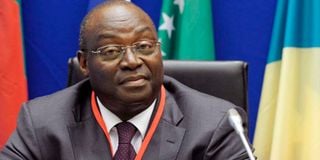Côte d’Ivoire's Ouattara names regional bank chief as deputy

Mr Tiemoko Meyliet Kone, governor of the Central Bank of West African States. He has been named they new vice president of Côte d’Ivoire.
Yamoussoukro
Côte d’Ivoire President Alassane Ouattara on Tuesday named a regional central banker to be his vice president and reappointed his prime minister to head a reshuffled cabinet whose emphasis will be belt-tightening.
In a key announcement following a spell of political turbulence, the 80-year-old president appointed Tiemoko Meyliet Kone, governor of the Central Bank of West African States (BCEAO), as his deputy.
He described Kone, a technocrat with a background in financial and monetary policy, as a "brilliant economist... a man of consensus and honesty who has all my trust."
In a state-of-the nation address to a joint session of parliament in the political capital Yamassoukro, Ouattara also said Prime Minister Patrick Achi was being reappointed to helm a reshuffled cabinet.
Stepped down
The government stepped down in a long-expected move last Wednesday ahead of cabinet changes expected to usher in official austerity.
Ouattara has been in power since he won elections in 2010, whose disputed outcome sparked a conflict that claimed several thousand lives.
His succession has been a key issue in the West African state, fuelling tensions that have boiled over into violence.
Ouattara had made plans to retire in 2020 after two terms in office, but the scheme was put on hold after his anointed successor, then prime minister Amadou Gon Coulibaly, died suddenly.
Ouattara dusted off a bid for a third presidential term, sparking bitter criticism that he was circumventing term limits under the constitution.
Eighty-five people died and around 500 were injured in election-related violence, and the country's main opposition boycotted the polls.
In its aftermath, Ouattara last year ushered in his former rival and predecessor, Laurent Gbagbo, who has played the role of elder statesman in a declared effort of national reconciliation.
Technocrat VP
The post of vice president has been vacant for nearly two years, after Daniel Kablan Duncan stepped down, citing personal reasons.
Ouattara heaped praise on Kone, who was given an ovation by lawmakers as he stepped forward to shake the president's hand.
"He is a figure who has demonstrated his personal and professional quality at every senior level that he has occupied in public service, the Ivorian government and outside Côte d’Ivoire," Ouattara said.
Kone, 72, has been head of the BCEAO for 11 years, notably overseeing a reform of the CFA franc — the eight-nation currency shared by Benin, Burkina Faso, Côte d’Ivoire, Guinea-Bissau, Mali, Niger, Senegal and Togo.
He previously served as chief of staff to former prime minister Guillaume Soro; as minister for construction; and as special advisor to Ouattara himself, with responsibility for economic and monetary affairs.
Austerity
Achi has been tasked with forming a government with a maximum of 30 ministers, compared with more than 40 today.
He was appointed in April last year after his predecessor Hamed Bakayoko died of cancer the previous month. Bakayoko himself succeeded Coulibaly on his death in July 2020.
"The government that will take office this week will be streamlined to take into account the world economic outlook and the need to reduce state expenditure," Ouattara said.
Eyeing concern about rising inflation, the authorities last month placed a ceiling on the price of around 20 staple products, such as rice and sugar.
Jihadists’ bloody campaign
The government has also been worried that jihadists who have launched a bloody campaign in the Sahel region to Côte d’Ivoire's north are seeking to push southwards towards the Gulf of Guinea.
But Ouattara said, "The security situation is calm and under control across the country."
He also paid tribute to the "dialogue" in domestic politics, which he said had helped strengthen "peace and stability."
Municipal and regional elections are due to take place next year, while the next presidential elections are scheduled for 2025.
Ivorian political analyst Arthur Banga said "no message came out today on (Ouattara's) succession... it remains totally unclear."
"The prime minister has a greater political impact than the vice president, but we don't know yet how the president intends to share out the roles" between Kone and Achi, he said.





